Related Research Articles

Randolph Charles Bachman is a Canadian guitarist, singer, and songwriter. He was a founding member of the bands The Guess Who and Bachman–Turner Overdrive. Bachman recorded as a solo artist and was part of a number of short-lived bands such as Brave Belt, Union and Ironhorse. He was a national radio personality on CBC Radio, hosting the weekly music show, Vinyl Tap. Bachman was inducted into the Musicians Hall of Fame and Museum in 2016.
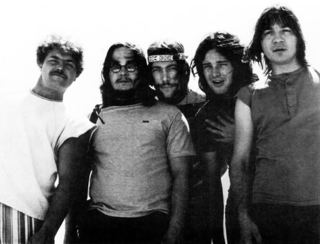
The Guess Who are a Canadian rock band from Winnipeg, Manitoba, best known for their blues rock and psychedelic rock hits from 1968 to 1975.

Burton Lorne Cummings, is a Canadian musician, singer, and songwriter from Winnipeg, Manitoba. He is best known for leading The Guess Who during that band's most successful period from 1966 to 1975, and for a lengthy solo career.
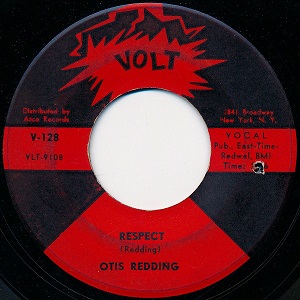
"Respect" is a song written and originally recorded by American soul singer Otis Redding. It was released in 1965 as a single from his third album Otis Blue/Otis Redding Sings Soul and became a crossover hit for Redding. In 1967, fellow soul singer Aretha Franklin covered and rearranged "Respect", resulting in a bigger hit and her signature song. The music in the two versions is significantly different, while a few changes in the lyrics resulted in different narratives around the theme of human dignity that have been interpreted as commentaries on traditional gender roles.

"Proud Mary" is a song written by John Fogerty and first recorded by his band Creedence Clearwater Revival. It was released by Fantasy Records as a single from the band's second studio album, Bayou Country, which was issued by the same record company and is generally considered to have been released in early January 1969, although one source states that it came out just before Christmas 1968. The song became a major hit in the United States, peaking at No. 2 on the Billboard Hot 100 in March 1969, the first of five singles to peak at No. 2 for the group.
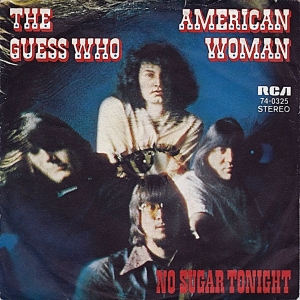
"American Woman" is a song released by the Canadian rock band the Guess Who in January 1970, from their sixth studio album of the same name. It was later released in March 1970 as a single backed with "No Sugar Tonight", and it reached number one for three weeks commencing May 9 on both the United States' Billboard Hot 100 and the Canadian RPM magazine singles chart. Billboard magazine placed the single at number three on the Year-End Hot 100 singles of 1970 list, and it was listed as number five for 1970 on the RPM Year-End Chart. On May 22, 1970, the single was certified as gold by the Recording Industry Association of America (RIAA). It also reached the top ten in the Netherlands, Switzerland and Austria, and the top twenty in the United Kingdom and New Zealand.

"Shakin' All Over" is a song originally performed by Johnny Kidd & the Pirates. It was written by leader Johnny Kidd, and his original recording reached No. 1 on the UK Singles Chart in August 1960. The song is sometimes credited to Frederick Albert Heath, which is Kidd's real name. Kidd's recording was not a hit outside Europe. In other parts of the world the song is better known by recordings from other artists.

"Until You Come Back to Me " is a song written by Morris Broadnax, Clarence Paul, and Stevie Wonder. The song was originally recorded by Stevie Wonder in 1967, but his version was not released as a single and did not appear on an album until 1977's anthology Looking Back. The best-known version of this song is the 1973 release by Aretha Franklin, who had a million-selling top 10 hit on Billboard charts. The song reached No. 1 on the R&B chart and No. 3 on the Hot 100 chart in 1974. It became an RIAA Gold record.

"Get Together", also known as "Let's Get Together", is a song by American rock band The Youngbloods, originally included in their 1967 self-titled debut album The Youngbloods. It was written in the mid-1960s by American singer-songwriter Chet Powers, from psychedelic rock band Quicksilver Messenger Service. The single was The Youngbloods' only Top 40 on Billboard Hot 100—peaking at number five in 1969.

"Hurting Each Other" is a song popularized by the Carpenters in 1972. It was written in 1965 by Gary Geld and Peter Udell, and has been recorded many times by artists ranging from Ruby & the Romantics to Rosemary Clooney.

Shakin' All Over is the debut studio album by the Canadian rock band The Guess Who, although at the time they were known as "Chad Allan & the Expressions". It is regarded as a garage rock album and features their hit version of Johnny Kidd & the Pirates hit song "Shakin' All Over".
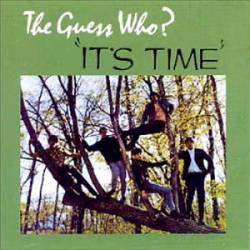
It's Time is the third studio album by the Canadian rock band the Guess Who. It's also the last to feature original lead singer Chad Allan who left after the release of the album. This album introduces Burton Cummings and Bruce Decker of The Deverons. Bruce Decker is shown on the album cover, but did not perform on the album. This album was a big turning point for the group. The album draws towards their garage rock style.

"Part-Time Love" is a song written by Elton John with lyrics by Gary Osborne. It is the sixth track off his 1978 album, A Single Man. It is also the opening track of side two. It proved to be one of the most popular singles the pair wrote, along with 1982's "Blue Eyes" and the 1980 US million seller "Little Jeannie". It was banned in the Soviet release of the album along with another song, "Big Dipper". The single reached #15 in the UK and peaked just outside the Top 20 in the U.S. at #21.
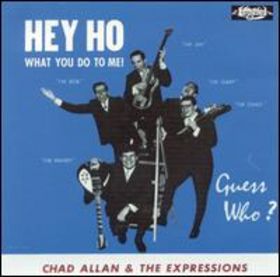
Hey Ho is the second studio album by the Canadian rock band The Guess Who. This album is also the last to feature Bob Ashley on keyboards. This album was originally released on Quality Records in 1965. The cover gave credit to "Chad Allan & the Expressions ". It is regarded as a garage rock album.

"Star Baby" is a 1974 hit song by The Guess Who. It was written by Burton Cummings who also provided the lead vocals. It is classified in the genre of Power pop and was included on the group's LP entitled, Road Food as well as The Guess Who – Greatest Hits in 1999 and The Guess Who - Anthology in 2003. The band performed the song on the Midnight Special television program on December 14, 1973.
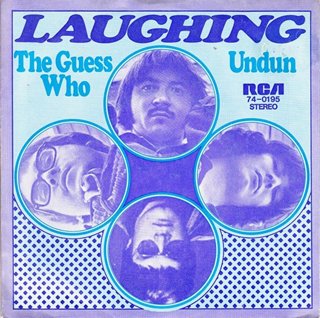
"Laughing" is a popular song by Canadian rock band The Guess Who. It peaked at #1 on the Canadian Singles Chart for a single week and at #10 on the United States' Billboard Hot 100, becoming the band's second single to reach the Top 10 on the latter. It became their second of three gold records in the United States and also made the Top 20 on singles charts in New Zealand and South Africa.
Hey Ho may refer to:

"Believe Me" is a song written by Randy Bachman and performed by The Guess Who. It reached #10 in Canada in 1966. The song was released in the United States as a single, but it did not chart. It was featured on their 1966 album, It's Time.
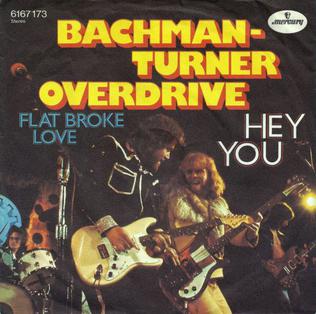
"Hey You" is a song written by Randy Bachman, and was first recorded by Canadian rock group Bachman–Turner Overdrive (BTO) for their 1975 album Four Wheel Drive. It was the first and more successful of two singles issued from the LP, the second being "Quick Change Artist", which was released in Canada only.
References
- ↑ Shakin' All Over/Hey Ho/It's Time at AllMusic. Retrieved September 01, 2015.
- ↑ The Guess Who, "Hey Ho, What You Do to Me" Canadian Chart Position Retrieved March 7, 2015
- ↑ The Guess Who, "Hey Ho, What You Do to Me" U.S. Chart Position Retrieved March 7, 2015
- ↑ The Guess Who, Hey Ho (What You Do to Me!) Retrieved March 7, 2015
- ↑ "CashBox Record Reviews" (PDF). Cash Box. August 14, 1965. p. 72. Retrieved 2022-01-12.
- ↑ The Guess Who, "Hey Ho, What You Do to Me" single release Retrieved March 7, 2015